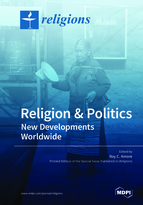Religion and Politics: New Developments Worldwide
A special issue of Religions (ISSN 2077-1444).
Deadline for manuscript submissions: closed (30 April 2019) | Viewed by 68884
Special Issue Editor
Interests: religion and politics; comparative Asian politics; religious fundamentalism; engaged Buddhism
Special Issues, Collections and Topics in MDPI journals
Special Issue Information
Dear Colleagues,
This Special Issue on “Religion and Politics: New Developments Worldwide” will feature articles dealing with recent developments in the interaction of religion and politics. “Religion” here is broadly understood to encompass not only institutionalized religion(s) but also ethical, ritual or social issues that form a part of the religious milieu. “Politics” is also broadly conceived to encompass not only government structures or political parties but also the social movements that tend to influence, sooner or later, the values that shape government policies.
The referees and guest editor will be looking for articles that focus on something new, meaning some development that has either taken shape fairly recently or has gained new strength recently. Articles may focus on a specific country (e.g., “The Increasing Role of Hindu Nationalism in Indian Politics”), on a region (e.g., “New Trends in the Anti-Immigration Parties in Europe”), or on a worldwide theme (e.g, “The Growing Influence of Evangelical Christianity”).
Contributions of sound scholarship arising from any academic discipline relevant to the Special Issue’s focus are welcome; including but not limited to political science, religious studies, sociology, anthropology, women’s studies, journalism or media studies.
The intent of this Special Issue is to provide readers with articles, based on sound scholarship, that advance the understanding of current developments in Religion and Politics anywhere in the world.
Prof. Roy C. Amore
Guest Editor
Manuscript Submission Information
Manuscripts should be submitted online at www.mdpi.com by registering and logging in to this website. Once you are registered, click here to go to the submission form. Manuscripts can be submitted until the deadline. All papers will be peer-reviewed. Accepted papers will be published continuously in the journal (as soon as accepted) and will be listed together on the special issue website. Research articles, review articles as well as short communications are invited. For planned papers, a title and short abstract (about 100 words) can be sent to the Editorial Office for announcement on this website.
Submitted manuscripts should not have been published previously, nor be under consideration for publication elsewhere (except conference proceedings papers). All manuscripts are thoroughly refereed through a double-blind peer-review process. A guide for authors and other relevant information for submission of manuscripts is available on the Instructions for Authors page. Religions is an international peer-reviewed open access monthly journal published by MDPI.
Please visit the Instructions for Authors page before submitting a manuscript. Submitted papers should be well formatted and use good English. Authors may use MDPI's English editing service prior to publication or during author revisions.
Keywords
- political science
- religious studies
- sociology
- anthropology
- women’s studies journalism
- media studies






